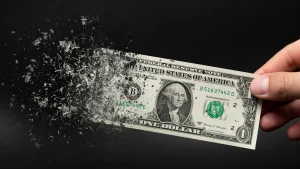Inflation is an ever-present economic phenomenon that can have a significant impact on your financial well-being. While often discussed in the context of investment portfolios or the cost of living, its effects on checking accounts are frequently overlooked.
In the United States, where inflation rates have fluctuated dramatically in recent years, understanding how inflation erodes the value of money in checking accounts is crucial. This article delves into the impact of inflation on checking accounts and offers practical strategies to protect your hard-earned money from losing its value.
Understanding inflation’s impact on checking accounts

The erosion of purchasing power
Inflation, by definition, is the rate at which the general level of prices for goods and services rises, eroding the purchasing power of money. For individuals with money parked in checking accounts, this means that over time, the real value of their deposits decreases.
For example, if inflation is running at 3% annually, the same amount of money in your checking account will buy 3% less in goods and services at the end of the year compared to the beginning. This might seem negligible in the short term, but over several years, the loss of purchasing power can be substantial.
Moreover, checking accounts typically offer minimal interest rates, often close to zero. This means that the money in these accounts is not growing at a rate that can keep up with inflation. As a result, the real value of the money diminishes, effectively reducing the wealth of individuals who rely heavily on checking accounts for their day-to-day financial needs.
The silent wealth erosion
While inflation’s impact on investments like stocks or bonds is well-documented, its effect on liquid assets such as checking accounts is more insidious. Because the erosion of wealth happens gradually, many people do not notice the loss until they realize that their money doesn’t stretch as far as it used to.
This silent erosion can be particularly damaging in periods of high inflation, where the value of money decreases more rapidly. For individuals living on fixed incomes or those who keep significant portions of their savings in checking accounts, the effects can be devastating, making it crucial to take proactive steps to mitigate these impacts.
Strategies to protect your money from inflation
Diversifying your savings
One of the most effective strategies to protect your money from inflation is to diversify your savings across different financial instruments. While checking accounts are necessary for day-to-day transactions, keeping large sums of money in these accounts is not advisable in an inflationary environment.
Instead, consider moving excess funds into savings accounts, money market accounts, or certificates of deposit (CDs) that offer higher interest rates. These accounts are designed to provide a better return on your money, helping to offset the effects of inflation.
Additionally, investing in assets that traditionally outpace inflation, such as stocks, real estate, or Treasury Inflation-Protected Securities (TIPS), can help grow your wealth over time. By diversifying your savings and investments, you can create a balanced portfolio that not only protects your money from inflation but also allows it to grow, preserving and potentially increasing your purchasing power in the long term.
Utilizing high-yield checking accounts
For those who prefer to keep their funds easily accessible, high-yield checking accounts offer a viable alternative to traditional checking accounts. These accounts often provide interest rates that are higher than the national average, helping to counteract the impact of inflation.
However, it’s essential to read the fine print, as high-yield accounts may come with certain requirements, such as maintaining a minimum balance, setting up direct deposits, or limiting the number of transactions per month. By meeting these conditions, you can ensure that your money is working harder for you, earning interest that helps mitigate the erosion of purchasing power caused by inflation.
While high-yield checking accounts may not fully protect against high inflation rates, they can offer a better alternative to standard checking accounts, providing a modest cushion against the gradual loss of value.
Staying ahead of inflation with smart financial habits
Regularly reviewing and adjusting your financial plan
To effectively combat the impact of inflation on your checking account, it’s essential to develop and maintain smart financial habits. Regularly reviewing your financial plan and making adjustments as needed can help you stay ahead of inflation. This involves monitoring interest rates, inflation trends, and the performance of your investments. If inflation is on the rise, it might be time to reconsider your strategy and move more funds into inflation-resistant assets.
Additionally, creating and sticking to a budget that accounts for inflation is crucial. As prices rise, your cost of living will inevitably increase. By planning for these changes and adjusting your spending habits accordingly, you can maintain your financial stability even in the face of inflation. This proactive approach ensures that you are not caught off guard by rising prices, allowing you to protect your savings and maintain your purchasing power.
Building an emergency fund in inflation-protected accounts
Another critical component of staying ahead of inflation is building an emergency fund in accounts that offer some protection against inflation. While checking accounts are essential for liquidity, your emergency savings should ideally be in accounts that offer higher returns, such as high-yield savings accounts or money market accounts. These accounts provide a buffer against inflation while still keeping your funds accessible in case of an emergency.
Moreover, consider keeping a portion of your emergency fund in inflation-protected securities like TIPS, which adjust for inflation and provide a guaranteed return. By diversifying your emergency savings, you can ensure that your financial safety net remains intact, even as inflation erodes the value of money in traditional checking accounts.
This approach not only protects your immediate needs but also secures your financial future. Inflation is an unavoidable reality that can significantly impact the value of money in checking accounts. By understanding how inflation erodes purchasing power, diversifying your savings, utilizing high-yield accounts, and maintaining smart financial habits, you can protect your money from losing value.
Taking proactive steps to safeguard your finances against inflation will help you maintain and grow your wealth, ensuring that your hard-earned money continues to serve you well in both the present and the future.





